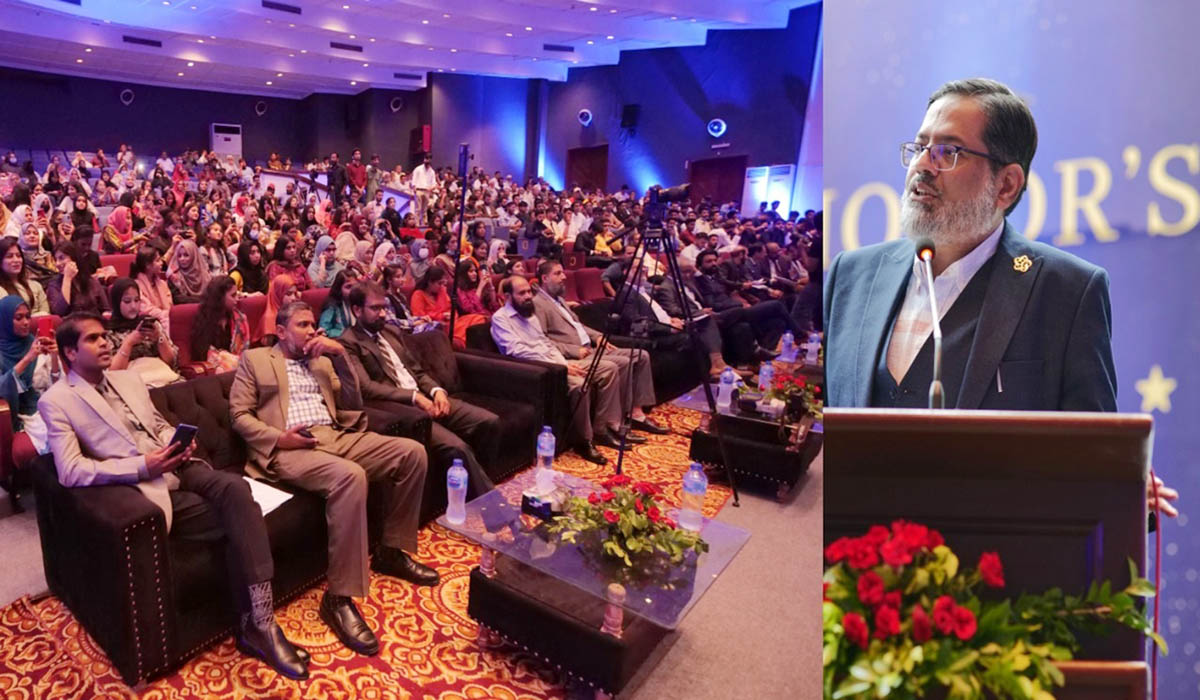The present education system, especially the examination policy and methods required urgent corrective steps to make it an effective and credible tool of disseminating the latest world knowledge by promoting competence and real value of students, instead of “racism” damaging their future with the ultimate loss of the country.
This was articulated by Chief Executive Officer, The Meritorious Education Network, Dr. Safiuddin Siddiqui while addressing a big number of MEN students at the ‘Honor’s Day’ ceremony here held to acknowledge and honor the students with awards who performed excellently in different level exams under his educational network, and those Meritorians getting admissions on merit in different professional institutions within and outside the country.
He identified major issues with the education system mainly relating to the matric and intermediate exams, and the curriculum in the province. He said that for proper management and pursuance of the entire academic cycle — from admissions to examinations – the education calendar for the year be fixed and announced before the beginning of the academic year. Mostly, the dates or programs were not final. Even the examination schedule used to be announced one or two months before and sometimes suddenly changed a few days before the exams.
The exam dates must be fixed in the education calendar and the exact timetable is announced at least six months before. Instead, he regretted, the boards of examinations did announce timetables just fifteen days before the examination, he said.
“Students do not know about the exams schedule and timetable till last month. This creates embarrassment among them and is not a good sign to the credibility of the education system,” he mentioned.
He cited the examples of the O and A level exams system and of the Aga Khan Board where the dates and timetables of exams were fixed and available on their websites well on time.
The second major issue, he pointed out, was the non-availability of the revised/updated curriculum books in Sindh; even a new academic year had begun. This would put students in trouble as they would have to study old books for a few months till the availability of new books.
“For the first year, the new syllabus was finalized last year but books are not in the market till now,” he said.
Thirdly, the pattern of examinations needs to be changed to modern methodology. The table of specifications was either missing or not followed which was needed to ensure equal representation of all the chapters of a subject in the question paper. And, mostly the questions were recall based (racism) and they did not determine the competence of students but encouraged them to “racism.” For example, in Physics or Chemistry papers there were questions about the inventors of particular things.
Similarly, in an English paper, students were questioned about the birthplace or date of an author. Dr. Safiduddin Siddiqui, MEN’s CEO and senior educationist who was also a gold medalist in matric and intermediate exams of the Karachi board advised the students to focus on their studies and avoid paying attention to un-verified postings about exams or other academic activities on Facebook or other social media sources. Only they should be in contact with their institutions for the right information they needed.
“Students’ goal should be to make the the best use of their energy and time for developing competence and pass exams with the highest numbers,” he asserted.
He also emphasized that realizing the increasing importance of aptitude tests like MCAT and ECAT amid rapid rise in competition on a very limited number of seats in the institutions based in this mega city particularly in medical and engineering, the students should start preparing for those tests from the day they got admission in the first year (XI).
Along with their routine studies of intermediate classes, the students should seriously prepare for aptitude tests for two years which would greatly help them get admissions to high-standard professional degree institutions Along with their routine studies of intermediate classes, the students should seriously prepare for aptitude tests for two years which would greatly help them get admissions in high-standard professional degree institutions on merit. In India, the students did follow this practice for a long.




















